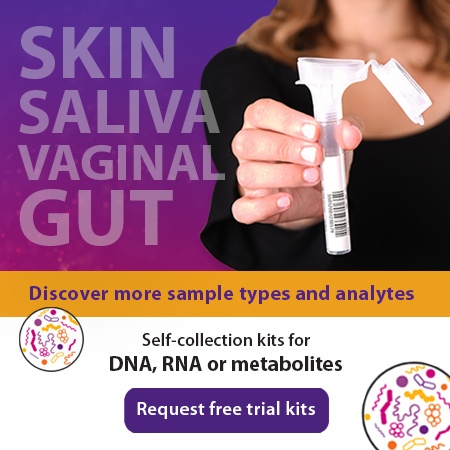2017-12-05
Crohn’s and Colitis Awareness week was developed to raise awareness and increase understanding of these common diseases. Crohn’s disease and Ulcerative Colitis, together referred to as Inflammatory Bowel Disease, are serious illnesses that affect more than 5 million people worldwide. We would like to shed some light on these diseases, the treatments, and the interactions between the microbiome and IBD.

IBD or IBS?
What is the difference between Inflammatory Bowel Disease (IBD) and irritable bowel syndrome (IBS)? Often mistaken for each other, these acronyms represent two very different conditions. When talking about IBD, we are typically referring to the two main forms of IBD; Crohn's Disease and Ulcerative Colitis. Both involve long-lasting inflammation and ulcers (sores) in the digestive tract and have diarrhea and abdominal pain as the main symptoms. In contrast, while IBS does not involve inflammation, IBS symptoms can include diarrhea and intense stomach cramps, similar to IBD. The similarity in the symptoms of IBD and IBS may lead to the common misconception that IBD and IBS are one and the same.
Emerging treatment for IBD – the microbiome
There is currently no cure for IBD, only treatment. From the available treatments, medications that focus on alleviating symptoms by reducing inflammation (5 ASA-containing drugs) and/or preventing the immune system from causing inflammation (corticosteroids and other immunosuppressants) are the most common. While the latter is the standard of care for Crohn’s disease, many patients do not respond well which is driving the development of substitute or accompanying treatments.
Fecal transplantation is an emerging treatment consisting of transplanting stool from a healthy donor into a recipient’s large bowel to restore the normal microbiota community. Increasing evidence suggests that the gut microbiome has the functional capacity to induce or relieve autoimmune syndromes and that specific changes of the composition of gut microbiota are a common feature in patients with IBD(1)(2). The most consistent observation in patients with IBD is reduced bacterial diversity of their gut microbiome, a proportional shift in their microbiome composition(3). Clinical trials of fecal transplantation are showing promising results in treating the disease(4), although much work still needs to be done to elucidate whether the positive results are modulated primarily by a single bacterial species, a community of bacteria, or by bacterial metabolites.
Project ARCC: Accelerating Research in Crohn’s and Colitis
Several large cohort studies of the gut bacterial composition in patients with IBD have been published (5)(6)(7)(8). Some of the challenges associated with these studies are low enrollment and compliance rates, largely influenced by negative donor perception of self-collection of the liquid fecal or severe diarrhea samples common for IBD patients. To tackle this challenge we launched Project ARCC: Accelerating Research in Crohn’s and Colitis, in collaboration with Crohn’s and Colitis Canada. The goal of Project ARCC was to develop and test a sample collection protocol designed to improve self-collection of liquid stool samples. By recruiting patients diagnosed with IBD, we assessed the performance, compliance rate, and ease of use of this new protocol and developed a new OMNIgene●GUT collection accessory, OM-AC2, designed specifically for donors with severe diarrhea or liquid stool samples. The intuitive design of OM-AC2 works in combination with our OMNIgene●GUT microbiome collection kit, to collect a stabilized stool sample from donors with severe diarrhea in a way that is easy for donors and ensures consistent yields for down stream analysis.
For more information about Crohn's disease and ulcerative colitis, visit the Crohn's Colitis Foundation or if you’d like information on our new collection accessory, click here
References
[1] Ott SJ, et al. Reduction in diversity of the colonic mucosa associated bacterial microflora in patients with active inflammatory bowel disease. Gut.2004;53(5):685–693.[2] Frank DN, St Amand AL, Feldman RA, Boedeker EC, Harpaz N, Pace NR. Molecular-phylogenetic characterization of microbial community imbalances in human inflammatory bowel diseases. Proc Natl Acad Sci U S A. 2007;104(34):13780–13785.
[3] Hold, G. L., Smith, M., Grange, C., Watt, E. R., El-Omar, E. M., & Mukhopadhya, I. (2014). Role of the gut microbiota in inflammatory bowel disease pathogenesis: What have we learnt in the past 10 years? World Journal of Gastroenterology : WJG, 20(5), 1192–1210. http://doi.org/10.3748/wjg.v20.i5.1192
[4] Paramsothy, S., Kamm, M. A., Kaakoush, N. O., Walsh, A. J., van den Bogaerde, J., Samuel, D., ... & Xuan, W. (2017). Multidonor intensive faecal microbiota transplantation for active ulcerative colitis: a randomised placebo-controlled trial. The Lancet, 389(10075), 1218-1228.
[5] Gevers, D., Kugathasan, S., Denson, L. A., Vázquez-Baeza, Y., Van Treuren, W., Ren, B., ... & Morgan, X. C. (2014). The treatment-naive microbiome in new-onset Crohn’s disease. Cell host & microbe, 15(3), 382-392.
[6] Kronman, M. P., Zaoutis, T. E., Haynes, K., Feng, R., & Coffin, S. E. (2012). Antibiotic exposure and IBD development among children: a population-based cohort study. Pediatrics, 130(4), e794-e803.
[7] Pascal V, Pozuelo M, Borruel N, et al A microbial signature for Crohn's disease Gut Published Online First: 07 February 2017. doi:10.1136/gutjnl-2016-313235
[8] Imhann, F., Vila, A. V., Bonder, M. J., Fu, J., Gevers, D., Visschedijk, M. C., ... & Ter Steege, R. W. (2016). Interplay of host genetics and gut microbiota underlying the onset and clinical presentation of inflammatory bowel disease. Gut, gutjnl-2016.


